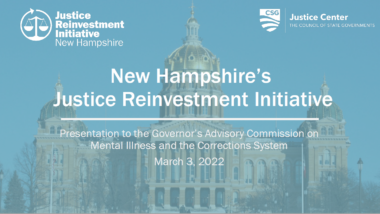
New Hampshire Launches Justice Reinvestment Initiative to Address Behavioral Health Needs
While crime and incarceration rates in New Hampshire are low, a large portion of the incarcerated population has an identified mental illness or substance use disorder, and behavioral health needs are a driver of jail incarceration and supervision revocations to prison.
State leaders have long worked to understand and address these challenges; however, mental illness and substance use disorder treatment and service providers have limited resources to meet the general need, let alone support people in the criminal justice system. As such, there is a high prevalence of people with behavioral health needs in New Hampshire’s jails and prisons, as incarceration settings are often the only option for holding and treating people with behavioral health challenges.
On March 3, 2022, the Governor’s Advisory Commission on Mental Illness and the Corrections System convened to officially launch New Hampshire’s Justice Reinvestment Initiative (JRI), which is focused on better understanding and serving people with behavioral health needs who cycle through the criminal justice and health systems. JRI is funded by the U.S. Department of Justice’s Bureau of Justice Assistance, Office of Justice Programs and The Pew Charitable Trusts.
In March, the Advisory Commission reviewed initial criminal justice and behavioral health trends in the state:
- In 2017 and 2018, an estimated 9 percent of adults in New Hampshire needed substance use treatment but did not receive it, the seventh-highest rate in the nation.
- Between 2014 and 2020, New Hampshire’s drug overdose death rate was far above the national rate.
- Rates of mental illness and substance use disorders among jail populations are higher compared to the general population, both nationally and in New Hampshire.
- As of 2019, more than 50 percent of people incarcerated in New Hampshire state prisons had an opioid use disorder and over half of parole revocations were related to substance use disorders.
Project Scope
The Council of State Governments (CSG) Justice Center is working closely with the Advisory Commission, jail superintendents, and Department of Health and Human Services (DHHS) to conduct a cross-system data match to analyze county jail and Medicaid claims with the goal of identifying key characteristics of people who are high utilizers of criminal justice and behavioral health resources.
Additionally, CSG Justice Center staff will engage system stakeholders to better understand the challenges they encounter in identifying and addressing behavioral health needs for people within the criminal justice system. Based on the findings from these quantitative and qualitative analyses, the state will consider and develop policy options that are designed to improve services for people with behavioral health needs within the criminal justice system, reduce recidivism, and increase public safety and public health outcomes throughout the state.
Emerging Themes and Next Steps
The Advisory Commission convened again on June 2, 2022, to receive an update on the data analysis process and discuss common themes from initial stakeholder engagement conducted by CSG Justice Center staff. Some of these themes included
- The prevalence of law enforcement and jails becoming the default response for people experiencing behavioral health crises;
- A lack of diversion and post-dispositional options statewide;
- Cross-system coordination challenges; and
- A general shortage of resources to support people who are high utilizers of both criminal justice and behavioral health resources.
The Advisory Commission, in partnership with jail superintendents and DHHS, will explore initial quantitative and qualitative findings in the fall of 2022 in preparation for the development of final recommendations in early 2023.
This project was supported by Grant No. 2019-ZB-BX-K002 awarded by the Bureau of Justice Assistance. The Bureau of Justice Assistance is a component of the Department of Justice’s Office of Justice Programs, which also includes the Bureau of Justice Statistics, the National Institute of Justice, the Office of Juvenile Justice and Delinquency Prevention, the Office for Victims of Crime, and the SMART Office. Points of view or opinions in this document are those of the author and do not necessarily represent the official position or policies of the U.S. Department of Justice.
About the author

Arkansas policymakers have long expressed concerns about the state’s high recidivism rate. Over the past 10 years, an…
Read MoreIn April 2025, Arkansas Governor Sarah Huckabee Sanders signed a package of bipartisan criminal justice legislation into law,…
Read More Explainer: Key Findings and Options from Arkansas’s Justice Reinvestment Initiative
Explainer: Key Findings and Options from Arkansas’s Justice Reinvestment Initiative
Arkansas policymakers have long expressed concerns about the state’s high recidivism rate.…
Read More Explainer: How a New Law in Arkansas Tackles Crime, Recidivism, and Community Supervision Challenges
Explainer: How a New Law in Arkansas Tackles Crime, Recidivism, and Community Supervision Challenges
In April 2025, Arkansas Governor Sarah Huckabee Sanders signed a package of…
Read More










